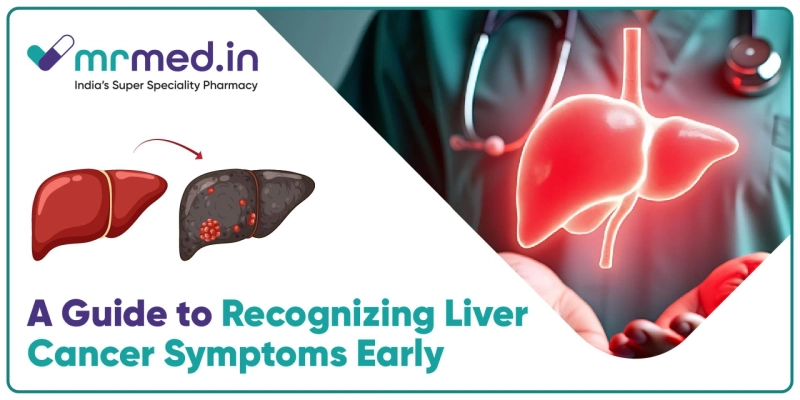The liver plays a vital role in keeping the body healthy by filtering toxins, storing nutrients, and aiding digestion. But when cancer develops in this organ, it often goes unnoticed in the beginning. Many early signs may seem like common health issues, such as tiredness, poor digestion, or weight changes. Recognising these early warnings can make a big difference in getting timely medical help. This guide highlights the symptoms, risk factors, and ways doctors detect liver cancer, along with how it differs from other liver-related problems.
What Are the First Symptoms of Liver Cancer?
Liver cancer usually starts silently, and symptoms may appear gradually. Because the signs are subtle, they are often ignored. Spotting them early improves the chances of effective treatment.
Early warning signs include:
- Feeling tired or weak without a reason.
- Loss of appetite and sudden weight loss.
- Ongoing nausea or frequent vomiting.
- A sense of fullness even after eating small meals.
- Pain or swelling in the upper right abdomen.
- Yellowing of the eyes and skin (jaundice).
Since these signs can overlap with other conditions, people often delay seeking help. This is why regular check-ups are very important for those at higher risk.
What Increases the Risk of Developing Liver Cancer?
Several health conditions and lifestyle factors can increase the likelihood of liver cancer. Knowing them can help in prevention and early monitoring.
Major risk factors include:
- Long-term hepatitis B or C infection.
- Liver cirrhosis (permanent scarring of the liver).
- Heavy alcohol intake over many years.
- Non-alcoholic fatty liver disease.
- Family history of liver disorders.
- Eating foods contaminated with aflatoxins (a toxin found in mouldy grains or nuts).
People who fall into these categories should undergo regular screenings so that potential issues can be identified early.
How Is Liver Cancer Diagnosed Early?
Early detection can be difficult, but medical tests can help identify the disease before it spreads further.
Common diagnostic steps include:
- Blood tests: Measuring alpha-fetoprotein (AFP) levels, which may be higher in people with liver cancer.
- Imaging scans: Ultrasound, CT scan, or MRI to detect abnormal growths.
- Biopsy: Examining a small liver tissue sample under a microscope.
For patients at high risk, regular monitoring is essential. In certain cases, advanced treatment options such as Cabzored 60mg, which contains Cabozantinib, may be prescribed, but early detection always provides the best treatment outcomes.
How Is Liver Cancer Different from Other Liver Problems?
Since many liver conditions share similar signs, people often confuse liver cancer with hepatitis or fatty liver. Here’s a simple comparison:

This table highlights why medical consultation is important only proper testing can confirm whether the issue is cancer or another liver disease.
Can Liver Cancer Be Prevented?
Not all cases can be avoided, but certain lifestyle choices can lower the risk.
Prevention tips include:
- Vaccination against hepatitis B.
- Timely treatment of hepatitis C.
- Reducing alcohol intake.
- Maintaining a healthy diet and weight.
- Staying physically active.
- Avoiding mouldy or contaminated foods that may carry toxins.
These steps support overall liver health and may help reduce the chance of cancer development.
What Are the Treatment Options for Liver Cancer?
Treatment choices depend on how advanced the disease is and the overall condition of the patient.
Main treatment methods include:
- Surgery: Removing the affected part of the liver.
- Liver transplant: Suggested when the liver is badly damaged.
- Targeted therapy and medicines: Designed to slow or stop cancer cell growth.
- Radiation therapy: Used to shrink tumours in certain cases.
- Supportive care: Improves quality of life during and after treatment.
The right approach is often decided by a team of specialists, tailored to each patient’s condition.
What Is the Outlook for Patients with Liver Cancer?
The outcome largely depends on how early the disease is diagnosed. When caught in the initial stages, surgery or a liver transplant can significantly improve survival chances. In later stages, treatments help manage symptoms and extend life expectancy.
Recovery depends on factors such as:
- Tumour size and whether it has spread.
- The health and functioning of the liver.
- The presence of other conditions such as cirrhosis.
- How well the patient responds to treatment.
Early detection remains the most important factor in improving survival and quality of life.
Final Thoughts
Liver cancer is often silent in the early stages, making awareness of subtle signs like fatigue, appetite loss, or abdominal pain essential. Regular health check-ups are especially important for those with risk factors such as hepatitis or cirrhosis. With modern treatments and better awareness, patients now have more options for management and recovery. But prevention and timely medical attention continue to be the best defence.



